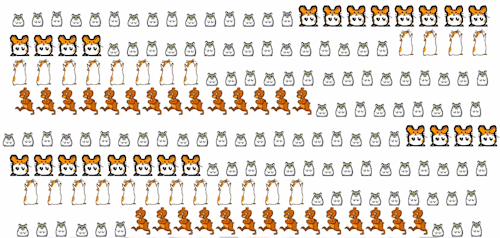
What’s the most infamous line in the Star Wars saga? “Luke, I am your father,” right?
There’s only one problem. That line is NEVER spoken in a Star Wars movie. Are you shocked? Probably not. It’s unlikely I’m the first smarmy thirtysomething to inform you that Darth Vader doesn’t say the words, “Luke, I am your father.” (Side note: Next time some upstart tries to slap you with this, ask him or her what the real line is. Because it’s, “No, I am your Father,” and let’s face it, that’s nothing to shout about.)
Thanks to Robot Chicken for fixing the infamous line.
So, why do we all misremember a line from a movie that’s part of our cultural heritage? Because we’re not misremembering. We’re just quoting the wrong movie. It is the exact line Chris Farley says in 1995’s Tommy Boy when he speaks into a running desk fan. It’s totally unrelated to Tommy Boy so we absorbed it as a reference to Star Wars and discarded the connection to Tommy Boy.
Actual Memes

Our long-lost Fat Guy in a Little Coat said those words in the era when Star Wars was out of the pop-culture cycle and slowly peeking its way back in. So we laughed because it felt good to hear a callback to something we all shared fifteen years earlier and were ready to rediscover. (And rediscover we did!) This kind of mass shared-thought with nebulous framework that appears in the collective conscious is also known as a meme.
It’s not just cats with melons on their heads. Disparate items like slang terms, that diamond S shape you drew on the chalkboard in 3rd grade, and even the religion of your choice fall under the term meme. It’s now more synonymous with images we post on social media into tedious oblivion, but the meme is much bigger. It’s refers to the illogical and largely unpredictable ideas we cook up as humans that seem self-evident and necessary, though often irrational. Those movie stills or embarrassing home pictures with bold, white text are more specifically known as Internet memes. Or, well, the get called that when you’re in a conversation about actual memes. I don’t recall hearing the word before the 00s.
Memes: A History
Richard Dawkins coined the term in his 1976 book, The Selfish Gene as a way to draw a parallel between social phenomena to the way genes replicate in living organisms. Obviously memes, with or without designation, go back much further than 1976. It could be argued that the moment a human communicated with another human, the meme was born.
Dawkins himself drew the distinction between internet memes and his original term by pointing to the presence of individual creative motivation in internet memes. True memes, as defined by Dawkins, are subject to random change and Darwinian shaping and molding.

Wrestling Richard Dawkins
On one hand, modern internet memes are a very specific field. Only a small percentage of Internet memes come about organically. Most are contrived and deliberate attempts to win the favor of social media users. On the other hand, the process by which these things fight to survive is tied, directly to the entities described by Dawkins in a time when the idea of a fictional shark was keeping people from swimming in the actual ocean.
I don’t think memes are only about making you laugh. It’s inescapable how much internet memes feel like an inside joke, despite being widely known. If I see one after it feels like everyone is already in on it, it’s not nearly as exciting. Unless I feel like I’m part of a gag early on, it feels deflated. I think the largely in-joke nature of modern humor speaks to our need to belong. Thinking that “What Does the Fox Say?” was funny is the same feeling as following pro sports or wandering who shot JR, or Mr. Burns. There’s a sense of community and culture in being mindful of something a group of your peers is mindful of. Then there’s an ego-boost with evangelizing that something with potential converts.
Much like popular religions or pop-culture fanaticism, there’s a sense of a shared perspective that draws one in. At the core of internet memes, you can see a reflection of the timeless memes that have been building human culture since we etched on cave walls and decided which animals to eat and which to pet. We get to watch little microcosms of our cultural building blocks play out week to week on Facebook.
Take a further step back, and you can watch the evolution of the internet meme, itself. I remember when there were just funny images that got emailed around or posted on E/N sites. One repeat joke was to spoof those 90s “motivational” posters which were images of random stuff with the big white text around it in a black border. That visual format got really popular and eventually the black border and concept went away. Now we pass those things around with whatever dumb joke and their link to motivational poster spoofs dies, apparently, with me.
It’s that kind of strange looseness that resonates within internet memes and historical memes alike. It seems cloudy motivation and inaccuracies are a built-in aspect of memes. Personally, I’m alright with calling that random change, but don’t tell Richard Dawkins I said that.

Brace Yourselves, Memes Are Coming
So it doesn’t matter that Darth Vader didn’t say “Luke,” Ned Stark never told anyone to brace themselves, and the majority of popular biblical quotes aren’t in the Bible. We fumble our way into culture just like we fumble our way into making a celebrity out of a weird looking cat.
For now, it’s easy to disregard much of modern culture because of its vapidity. But I make the case that, if nothing else, it’s a good idea to pay attention to the way we’re communicating and acting out. Even the dumbest replicating behavior can tell us secrets about the clockwork going on in our identity as a species.

